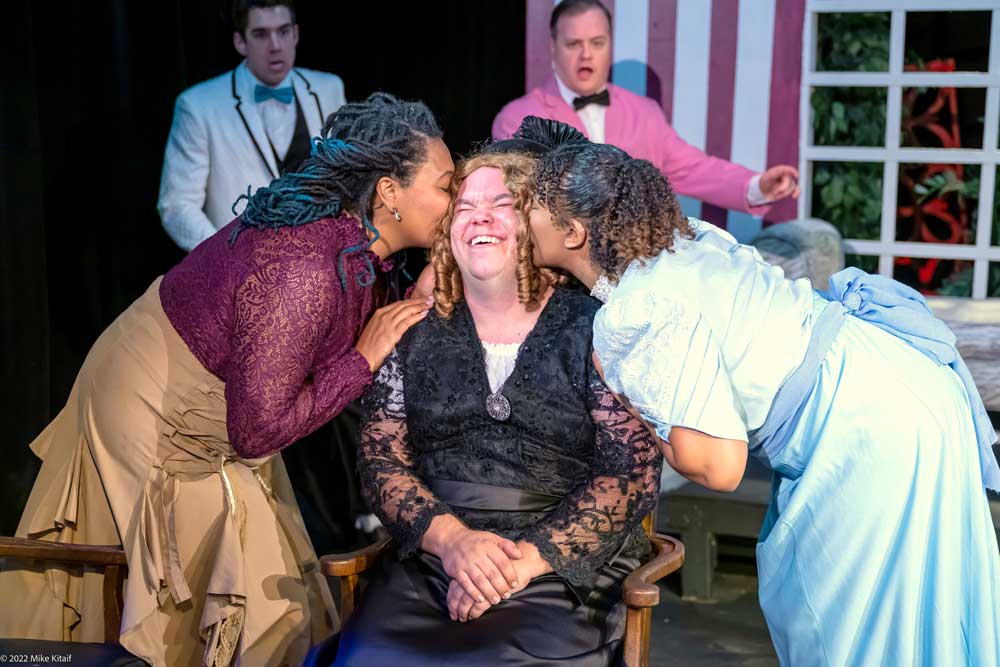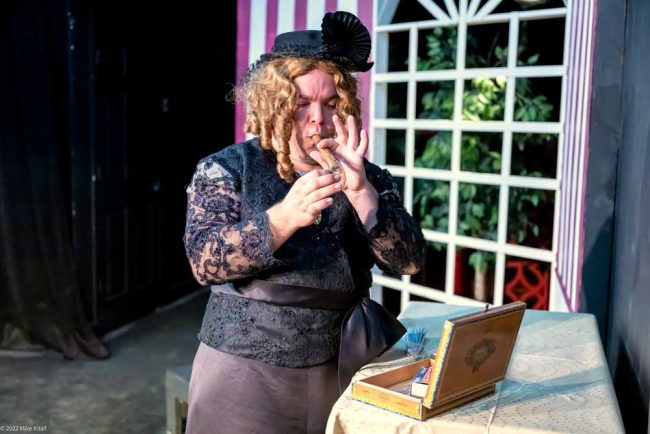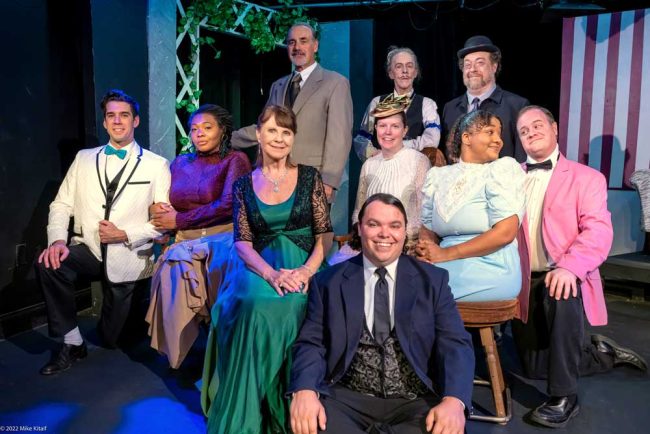
Beau Wade is one ugly woman.
That’s the consensus of the cast of “Charley’s Aunt,” the 130-year-old farce that City Repertory Theatre will stage Friday Oct. 28 through Sunday Nov. 6 at its black box venue in Palm Coast’s City Marketplace.
Wade portrays Lord Fancourt Babberly, who in turn dons a wig and a dress in a scheme that has him masquerading as the title character. (Yes, there are two Charley’s aunts – this is a farce, remember.)
“Beau walked in the door all dressed up like that, and I said ‘Oh, you are so ugly!’ ” says Joanne van Zyl, who portrays Donna Lucia D’Alvadorez, the actual Charley’s aunt in the play. “I was so embarrassed. I meant it to be funny — but he’s very handsome otherwise.”
But that “ugly” verdict isn’t unanimous, which becomes evident during a round-robin interview with some of the cast members.
“He looks fantastic in a dress!” says Cameron Hodges, employing a fanning, Don Juan-ish voice. “By George, splendid!”
OK, so Hodges, one assumes, had slipped into his character, Jack Chesney – who has selfish motivations to get Babberly into drag.
“Charley’s Aunt,” written by the Liverpool-born British playwright and actor Brandon Thomas, premiered in Suffolk, England, in early 1892. The comedy opened in London later that year, where it broke the then-current record for longest-running play worldwide, going for 1,466 performances. The farce landed on Broadway in 1893 and later toured internationally, and has been revived ever since, as well as adapted for films and musicals.
The play, which City Rep is staging as a quasi-period piece with the cast using British accents, tells the story of Jack and Charley, two Oxford University friends. Given the social mores of Victorian England, they desperately need a chaperone so they can invite their respective, prospective love interests, Kitty and Amy, to lunch. When the lads learn that Charley’s aunt Donna Lucia, a rich widow from Brazil whom he has never met, is coming to visit, they realize they have their chaperone.
The lads also invite their friend Babberly, who they hope will distract Charley’s aunt while they put the romantic moves on their intended love conquests. When Charley and Jack get word that Donna Lucia’s visit will be delayed, they convince Babberly to pretend to be Charley’s aunt. Chaos erupts when the real aunt arrives unexpectedly.

For Wade, a veteran City Rep actor and director, this will mark the third time he has cross-dressed on stage. Previously he portrayed an androgynous character in “Sylvia,” A.R. Gurney’s quirky, 1995 romantic comedy, and he played Dr. Frank N. Furter, that “sweet transvestite from transsexual Transylvania,” in City Rep’s 2018 production of “The Rocky Horror Show.”
“There are still some nerves any time you put on a dress,” Wade says. “It’s different when you walk around in a dress. It’s just a different air around you. People look at you differently. You’re giving off a different vibe.”
A quip is made about Wade in drag standing at the checkout line in a Publix, and he is quick to good-naturedly run with the conceit: “Yes, when I’m wearing a dress, people in line are like ‘What is going on there? That’s a very ugly woman!’ ”
While cross-dressing in theater may have begun with Og the Caveman donning a feminine animal skin to pass himself off as Ogette, the documented history of drag on stage can be traced back to the theater of the ancient Greeks, and continuing into the age of Shakespeare and up to modern times. But those long-ago Greek and Elizabethan thespians weren’t searching for comic effect or mischievous, psyche-provoking gender-bending: Rather, the patriarchal, even misogynistic dominance of those times dictated that women were inferior and shouldn’t be allowed to perform on stage. Hence female roles were played by males, and especially adolescent males in Shakespeare’s time.
While the history of drag, in and outside of show biz, has filled volumes, suffice it to say that by the time of Thomas’s smash Victorian play, things had changed, and all sorts of motivations beyond rank patriarchy led to performances with males dressing as females – as well as the occasional woman portraying Peter Pan or some male character. Those motivations could be purely theatrical (say, the sheer comic effect of seeing a nervous hetero man in women’s clothes) or socio-political (reflecting, among other cultural forces, the impact of the gay liberation movement spawned by the 1969 Stonewall riots, and the gay pride and LGBTQ movements of recent years.)
(By the way, some histories say the first recorded use of the word “drag” came in the Victorian era, and was spurred by the site of cross-dressing male performers, whose long, elaborate costume dresses would drag across stage floors.)
The list of memorable drag shows in the 20th century and early 21st century is long and includes films both silly and serious, such as “Some Like It Hot,” “Mrs. Doubtfire,” “Victor/Victoria,” “The Crying Game,” “The Adventures of Priscilla, Queen of the Desert,” “La Cage aux Folles,” “The Birdcage,” “Tootsie,” Tyler Perry’s Madea series and Jack Benny’s starring role in the 1941 film version of “Charley’s Aunt.” Drag has found a home on television too, including “RuPaul’s Drag Race” and Martin Lawrence’s ridiculous Sheneneh character.
As for “Charley’s Aunt,” Wade says, “I find that this example of a man wearing women’s clothes is very much like ‘Mrs. Doubtfire’ (that 1993 Robin Williams vehicle). The joke isn’t necessarily that it’s a man in a dress and it looks like a woman. It’s like ‘Look at this man in a dress making all these faux pas and just being terrible at being a woman.’ ”
But drag isn’t the only gag in the play.
Danno Waddell, who portrays Charley, says the farce “has a lot of comedy staples in it as well, things that you’ve probably seen and laughed at in other shows. Who knows, this play may have been the first to do it, or it’s copying people who came before it.”
One such staple, Waddell notes, is one character feeding lines to another character, and the receiving character “is just saying the lines verbatim instead of adapting them. So it’s like ‘Tell him you learned all about him.’ ”
At which point during the interview, Wade chimes in with “You learned all about him.”
The comedy employs slapstick, too.
“We do what we’ve dubbed a Scooby-Doo chase,” Waddell says.
Director John Sbordone adds that “the challenge for the cast, and they’ve been brilliant at it, is that that we’re working in a very small space. And we throw Beau around a lot of different ways. Over chairs, under chairs. Under benches, over benches. A lot of physical stuff.”
Except for Shakespeare’s “Macbeth” and “The Taming of the Shrew,” “Charley’s Aunt” may be the oldest play that City Repertory Theatre has staged during its 12 seasons.
“Its production history is quite interesting,” Sbordone says. “It played four years on the West End in London, then had a big run in New York. You look at its history, and it’s the most popular community theater play in the country. Then it’s not. It’s the most popular community theater play in the country. Then it’s not. It’s gone through waves.
“As far as I can see, it hasn’t been done in this area forever. So why not? One of the things we try to do is give our actors opportunities to play different styles, and so this is a different style.”
And, he adds, “People are going to laugh their asses off.”
The cast of “Charley’s Aunt” also includes: Laniece Fagundes as Kitty, Phillipa Rose as Amy, April Whaley as Ela, Jack Rose as Sir Francis Chesney, Edward Chausible Brassett as Brassett, and Earl Aaron Levine as Stephen.
–Rick de Yampert for FlaglerLive
![]()
“Charley’s Aunt” at City Repertory Theatre, 7:30 p.m. Friday Oct. 28, Saturday Oct. 29, Friday Nov. 4 and Saturday Nov. 5, plus 3 p.m. Sunday Oct. 30 and Nov. 6. Performances will be in CRT’s black box theater at City Marketplace, 160 Cypress Point Parkway, Suite B207, Palm Coast. Tickets are $20 adults and $15, available online at crtpalmcoast.com or by calling 386-585-9415. Tickets also will be available at the venue just before curtain time.






























Jack Neiberlein says
Another great show from CITY REP. The FPC Thespians are also staging STEEL MAGNOLIAS at the Flagler Auditorium this weekend. Let’s try to remember to support ALL the theater troupes in Flagler County not just some. I do.